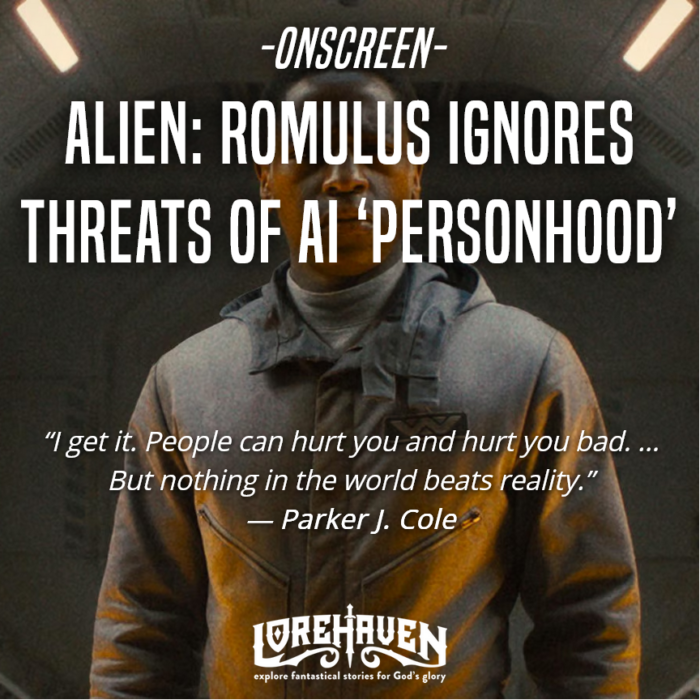Alien: Romulus Ignores Threats of AI ‘Personhood’
Alien: Romulus was a treat. Director Fede Álvarez’s movie returned to the forms that made the Alien franchise great—isolation, mystery, and unpredictability. The Alien franchise is very dear to me. It’s like the proverbial teddy bear my Granny gave me as a child: my childhood monsters in which I now find comfort.
In the theater, when the first alien burst out of the poor sap’s chest, I got a bit emotional. Granny would have loved this.
As I watched the film, however, I pondered how Alien: Romulus (and the whole franchise) explores the personhood of its android characters.
Protagonist (and Ripley rip-off) Rain (Cailee Spaeny) has a different kind of “brother.” Andy is a broken android her father had tried to fix and entrusted to take care of her. She grew up with the android and forms a close bond with hi.
Alien: Romulus explores relationships between humans and Andy (David Johnson). How much do free will and power affect the relationship between creation and creator? Does creation have the capacity to break away from its creator? If so, does the creator have the obligation to recapture and destroy the creation?
I find this question answered in Genesis 1. God gave mankind dominion over the earth. He gave us the capacity to explore all sorts of things, from our physical domains to more abstract and nebulous constructs.
But does this dominion enable us to give personhood to the objects we create?
In Alien: Romulus, Rain’s brother is eventually damaged. She must decide whether to risk her life to go back for him. The film presents this as a real dilemma.
Scripture challenges the premise of this story problem. Christians know that God created mankind for communion and worship. But we’re designed to find this communion in God and in others. In Genesis 1, God created male and female to satisfy human loneliness. From that moment, the first relationship is formed—marriage. God himself, the omniscient, omnipotent, and omnipresent Creator, was also there to commune with His creation.
Man reflects God’s communicable attributes like creativity, justice, and more. We mimic, in limited form, some of God’s nature, for we are created in His image. We long for community and are designed to provide this community for each other.
Conversely, our technology is meant to take dominion and explore the depth of God’s creation. It’s not meant to take on the personhood of people or to substitute for human interaction and community. Otherwise, if man could solve his loneliness by Himself, God wouldn’t have need to made Eve.
Technology is created in the image of man. Thus, our teach reflects our communicable attributes—our curiosities, our need for answers, and our constant desire for improvement. But personhood can’t be given. It’s inherent. When we create tech in our image, then make this into a substitute “personality, or worse, on the same level as ourselves, we quickly run into problems.
You can see this when people substitute AI bots for relationships with real people. Some women are using AI bots to find relationships. Conversely, many men would rather spend money on a sex “robot” powered by AI than deal with real women.
I get it. People can hurt you and hurt you bad. They can betray you. Break your heart. Kill you. Hate you. All our vices and sinful nature at top performance.
But nothing in the world beats reality.
Just like pain is real and we want to avoid it, it is also a necessity to know that our pain matters. Pain and triumph allow us to grow.
If we try to substitute AI “personhood,” we will forget that truth. And we may soon find ourselves begging our creations for a “community” they can never give.





























Share your fantastical thoughts.